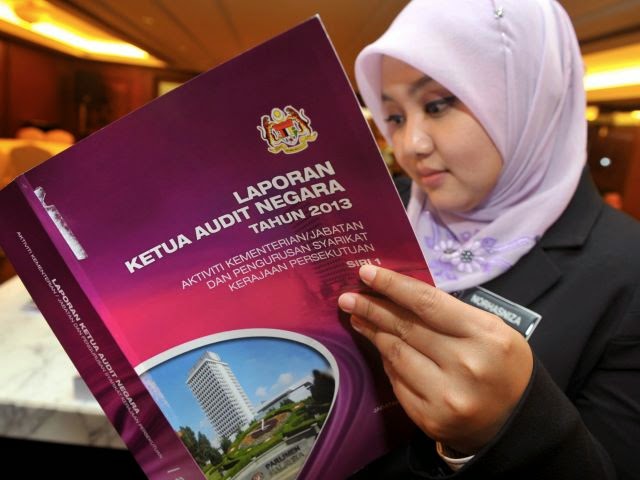
Malaysia's Auditor-General's Report 2013
THE National Higher Education Fund Corporation (PTPTN) was found to have “illogical” records of parents of loan applicants with a nurse said to be earning RM27.4mil.
 “Information of parents or guardians’ salary is important to determine
the eligibility of the loan applicant. However, it was found that there
were 384 record of salaries which were illogical compared to their job,”
the Auditor-General’s Report said.
“Information of parents or guardians’ salary is important to determine
the eligibility of the loan applicant. However, it was found that there
were 384 record of salaries which were illogical compared to their job,”
the Auditor-General’s Report said.Among others, it showed that a policeman earned RM1.98mil; while a clerk was paid just RM34 and a settler got a paltry RM2. The report also discovered 921 duplicated records, with students having between two and seven similar accounts.
In its reply, PTPTN said that it would sort out its data on borrowers’ information in its master file.
On another matter, the Auditor-General also criticised the agency for equipping its officers with both a personal computer and laptop, a move which cost more than RM100,000 in leasing fees. Yet, the 104 computers were left unused in storerooms.
“An officer should be alloted only one laptop which can be used both in the office or outside. Such a move could save PTPTN RM1.4mil in cost in three years.”
The report said PTPTN branches in Pahang, Sarawak, Perak and Negri Sembilan had 49 desktops and seven laptops left in the storerooms.
In its reply, PTPTN explained that 87 out of 104 computers had been installed in stages at its branches while the rest were used to facilitate the printing of National Education Savings Scheme deposit cards at all PTPTN counters.
As for the Prisons Department, it was ticked off for keeping its bread-making equipment at inappropriate places such as car parks.
The equipment was meant for its Bread Industry Self-Sufficiency Programme where prisoners could acquire new skills.
However, an audit on five prisons showed that the machines were not properly kept.
In its response on Feb 4, the department said the machines had been moved to a safer place and that the rusty ones had been cleaned up.
Health offices used funds meant for poor kids on own meals
PETALING JAYA: Money meant for food to feed malnourished children was instead spent on buying meals such as nasi lemak, kuih and teh tarik to be served at meetings by three district health offices.
The abuse is one of the key highlights of the 2013 Auditor-General’s Report which listed 283 issues related to wastage of funds, poor revenue and asset management, negligence as well as weak planning and monitoring of projects.
The shocking discovery showed that RM87,851 out of RM923,000 meant to feed poor rural children was misspent by the Jerantut, Gua Musang and Kota Kinabalu health offices, causing a public uproar.
The report pointed out that the funds were also misused by the three health offices to buy curtains, hampers for cooking programmes, and replica models of food items such as biscuits, nasi goreng, and nasi lemak.
Souvenirs, t-shirts for a choir group, as well as the rental of canopies for a family day were also among the items purchased.
Discrepancies were also found between the prices of food items in the tender documents and invoices.
As a result of the discovery, the Health Ministry set up an internal investigation committee on Feb 27 to investigate and reprimand the officers involved.
Suhakam commissioner James Nayagam described the abuse involving hungry children as a serious crime that should be investigated by the Malaysian Anti-Corruption Commission.
“This is corruption no matter how you cut the cake, because money meant for hungry children was used to feed those who were supposed to take care of them,” said Nayagam who has worked with children’s organisations for the past 33 years.
The report said that the weight recovery of the children in the Health Ministry’s Rehabilitation Programme for Malnourished Children, which started in 1989, also did not reflect the targets set.
The underweight children were found to have only achieved normal weight after a year and not within the six to 12 months promised by the programme.
A total of 8,556 children were in the programme between 2011 and 2013 with an allocation of RM66.51mil.
All the youngsters were supposed to receive food baskets comprising food items and multivitamins worth RM150 each under the programme.
The food baskets provided 104% of their calorie needs and 222% of their protein needs.
The report said some of the health offices went over the RM150 budget in buying the food items for the children due to the rise in the price of goods and the higher cost of certain items in rural areas.
A total of RM238,213 was overspent on the food baskets, with the Tawau health office found to have overspent by RM88.80 per basket.
The report said the ministry after being queried had set up an internal investigation committee on Jan 27 and that the probe on the matter was expected to be finished by the end of February.
The ministry had also explained to the auditors that it needed to spend not just on the malnourished children’s programme but on other programmes as well.
The report in its recommendations said officers must have a good grasp of financial regulations to ensure that allocations were spent according to the rules.
Health Minister Datuk Seri Dr S. Subramaniam, when contacted, declined to comment, saying his ministry would issue a statement in due time.
- Contributed b by RAZAK AHMAD,MAZWIN NIK ANIS and G. SURACH The Star/Asia News Network
Related:





